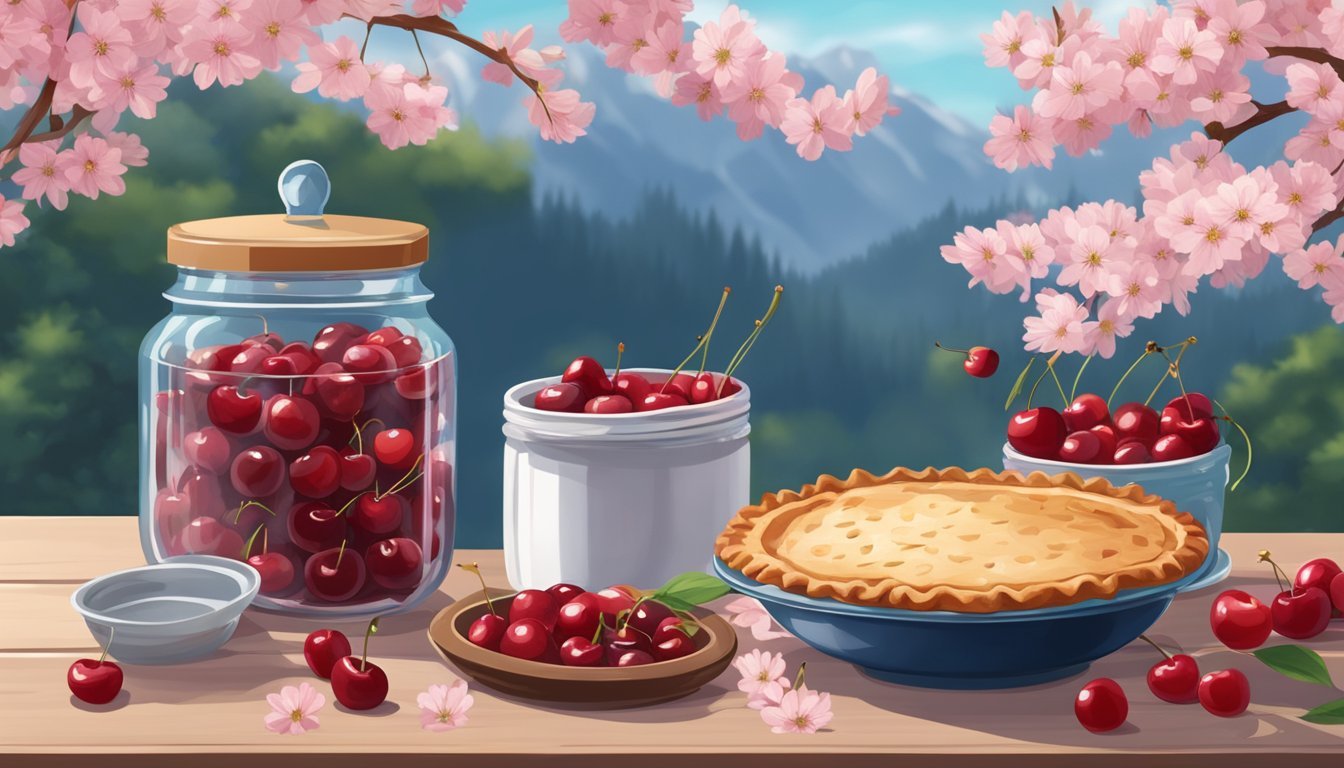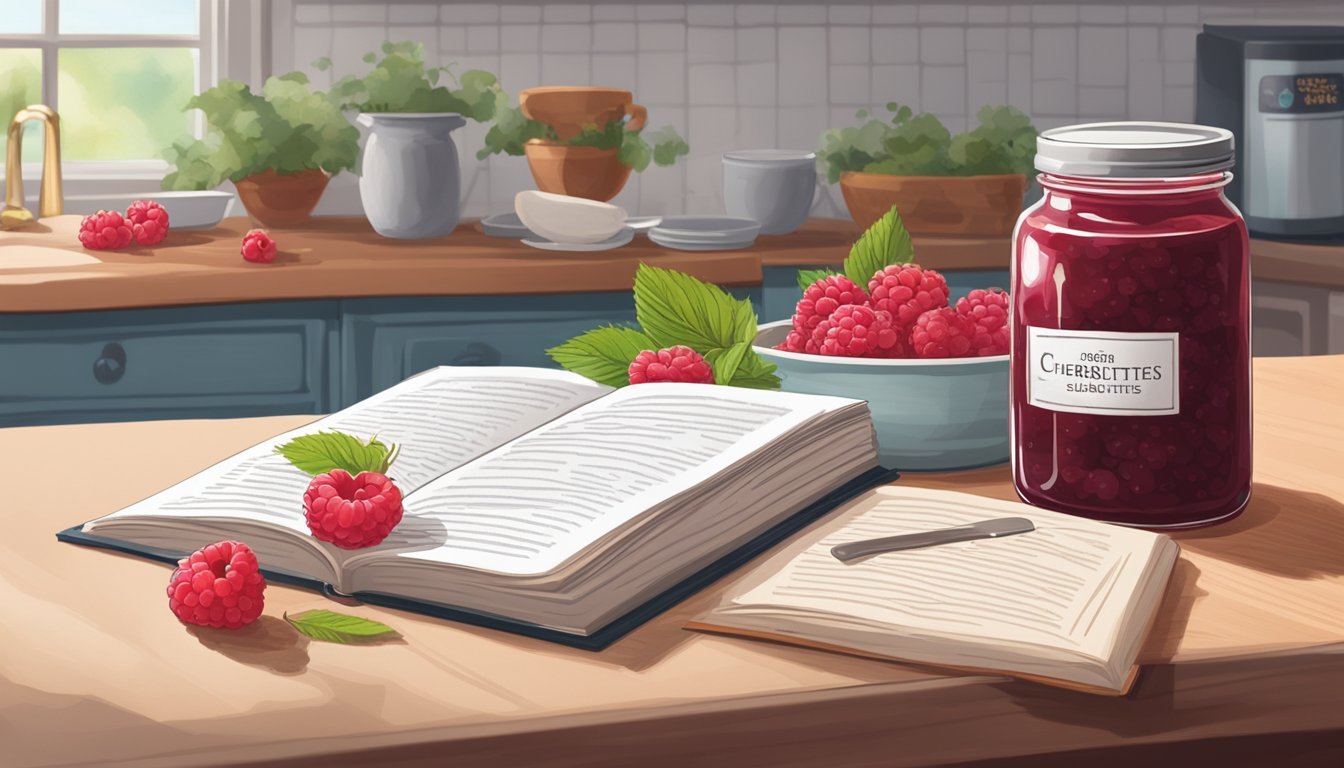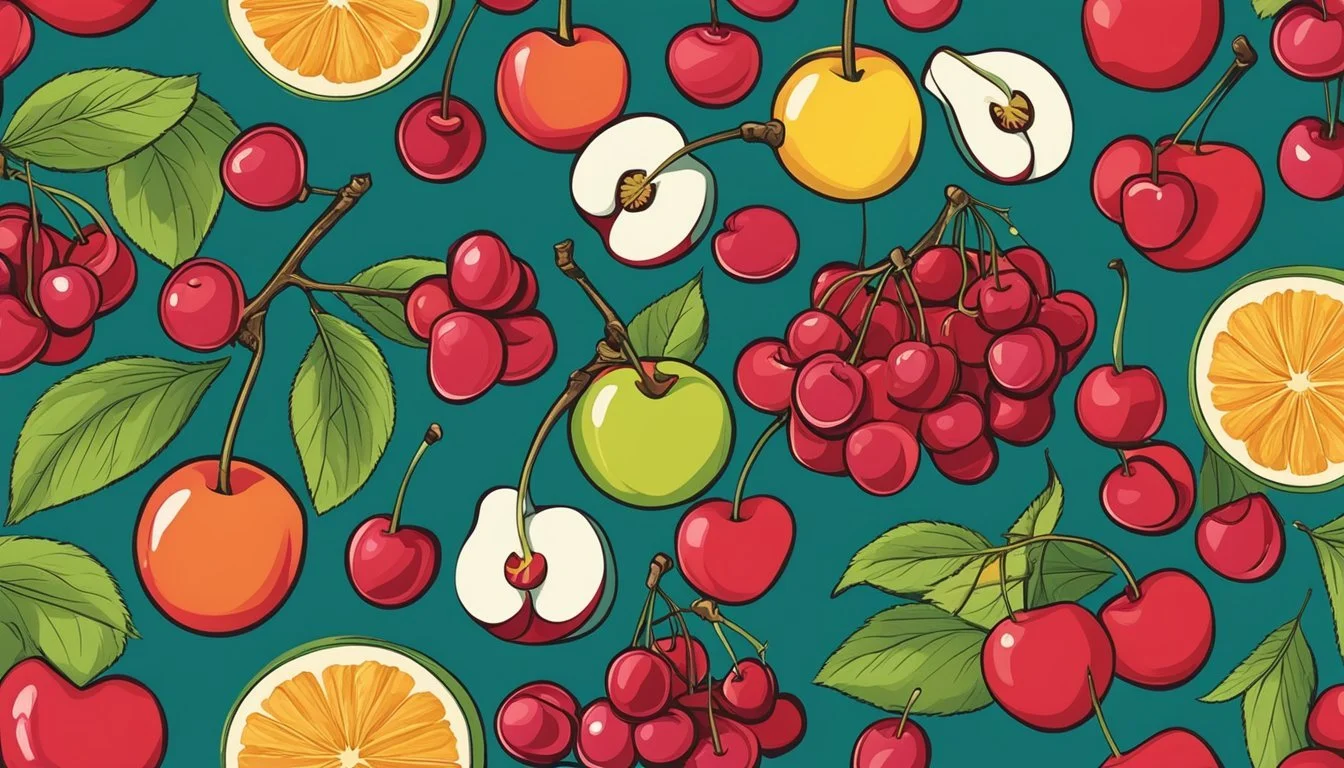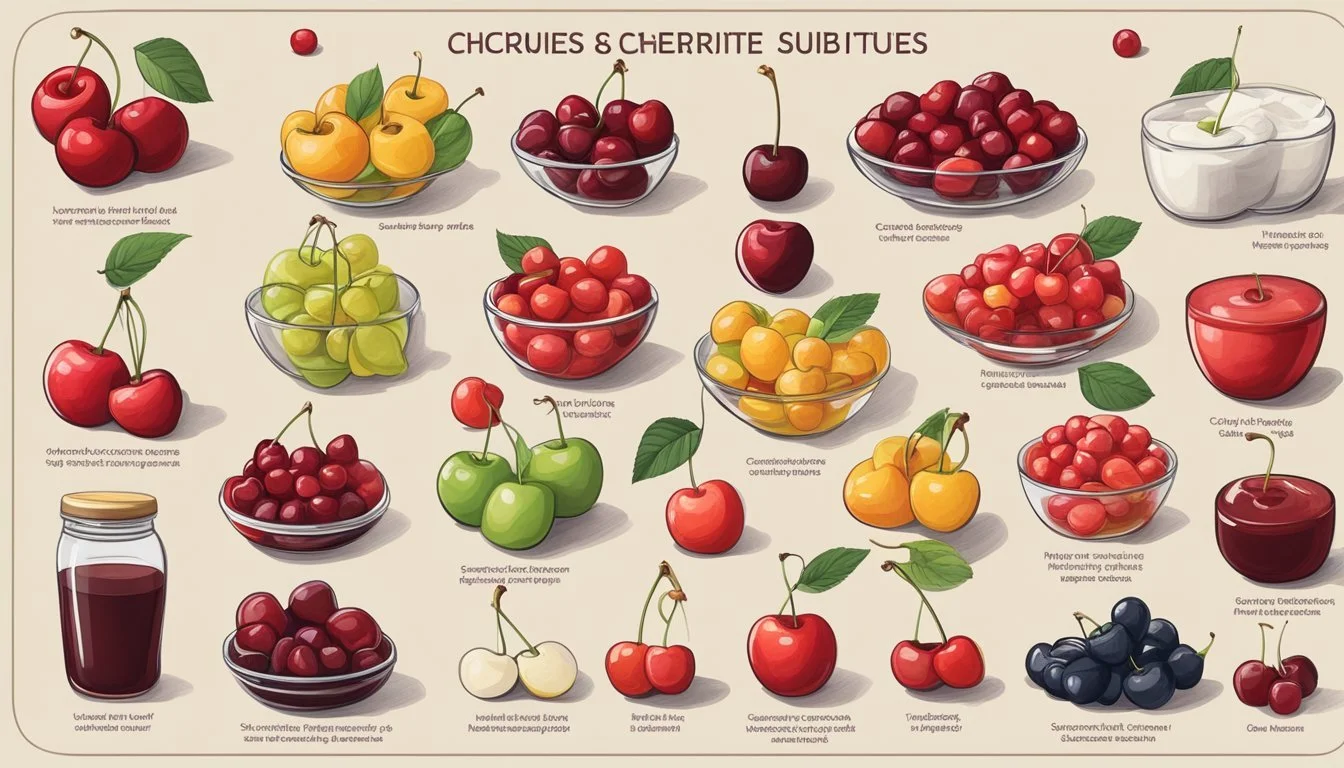Cherry Substitutes
Top Alternatives for Your Recipes
Cherries are a delightful fruit cherished for their sweet and tart flavor, vibrant color, and juicy texture. However, there are instances where these little red gems are out of season, too costly, or someone might simply not have them on hand when needed for a recipe. This situation calls for suitable cherry substitutes, ensuring dishes can still be prepared with a similar taste profile and visual appeal. There are a variety of alternatives available ranging from other stone fruits to various juices and extracts, offering a spectrum of flavors and textures that closely mimic cherries'.
Finding the right substitute depends on the intended use—whether for baking, cooking, or garnishing. In sweet and savory dishes alike, plums, apricots, and nectarines provide a great replacement; their flesh has a comparable succulence and a balance of sweetness and acidity. Canned cherries, dried cherries, and frozen cherries can also serve as convenient alternatives. These readily available forms retain the essential cherry characteristics and can be used in equal measure to fresh cherries in most recipes.
When the goal is to replicate cherry flavor rather than texture, cherry liqueur or extract might be the perfect option. These concentrated forms carry a potent cherry essence that infuses the dish with the desired flavor without introducing additional moisture. For those seeking a non-alcoholic choice, cranberry juice offers a tart and fruity taste, while for a richer feel, beetroot juice can provide a unique twist and a deep red color. Each substitute brings its own unique qualities to the table while still accomplishing the goal of emulating the original cherry essence.
Understanding Cherry Flavor Profiles
When selecting cherries for culinary use, one must consider the flavor profile of the type at hand, whether it is fresh or canned, as its characteristics profoundly influence the final taste and texture of the dish.
Fresh Cherries and Their Unique Taste
Fresh cherries come in a multitude of varietals, each presenting its own distinctive flavor and texture. Sweet cherries tend to be pleasingly sugary and juicy, often enjoyed raw. Bing cherries embody the classic cherry taste with their deep red color and firm texture. On the other hand, Rainier cherries feature a yellow skin with a red blush and are celebrated for their exceptional sweetness. In contrast, sour or tart cherries deliver a bold, tangy bite that excels in cooked dishes.
Sweet Cherry Varietals and Flavor Profiles:
Bing: Deep red, firm, classic cherry flavor.
Rainier: Yellow skin, red blush, very sweet.
Lapins: Similar to Bing, crack-resistant.
Sour Cherry Types:
Sour cherries are known for their robust, tangy flavor that brings a punch to recipes requiring a tart component.
Canned Cherries Versus Fresh: Flavor and Texture Differences
Canned cherries are often packed in syrup or water, which can alter their inherent flavor and texture. The canning process usually softens the cherries, and depending on the packing medium, their sweetness can either be heightened or undercut by added sugars or preservatives. Texture-wise, they tend to be more tender and less firm compared to their fresh counterparts. Sour cherries are less commonly found canned due to their bold flavor, which is generally preserved better through freezing.
Differences in Canned Cherries:
Aspect Fresh Cherries Canned Cherries Flavor Vibrant, natural sweetness Sweetened or preserved flavor Texture Firm to bite Softer, less crisp Sweetness Varies with varietal Often enhanced by syrup or juices
Fresh cherries typically offer a crisper texture and a more nuanced profile, making them preferable for fresh consumption and dishes where the integrity of the fruit is paramount. In contrast, canned cherries provide convenience and a different set of culinary opportunities, such as in sauces and fillings where the fruit's structure is less critical.
Substitutes for Cherries in Cooking
When cherries are unavailable for culinary uses, one can rely on a range of substitutes, each bringing their unique qualities to both savory and sweet dishes. Understanding the best replacements can ensure recipes retain their desired flavors and textures.
Fruit Replacements for Cherries in Savory Dishes
In savory recipes, cherries often add a burst of sweetness and a touch of acid, making them excellent for balancing the flavor profile. Here are some fruit substitutes that can serve a similar purpose:
Fresh Sour Cherries: They offer a comparable texture and tartness and work well in sauces and meat dishes.
Plums: As stone fruits, plums provide a sweet yet tangy flavor that can mimic cherries in chutneys and compotes.
Apricots: With their slightly tart nature, apricots can be chopped and used in salads or as a glaze for meats.
Frozen Cherries often retain much of the flavor and consistency of their fresh counterparts and can be used in equal measure in most savory recipes.
Alternative Fruits in Sweet and Dessert Applications
Desserts often depend on cherries for their distinct flavor. However, plenty of alternatives can take center stage in sweet recipes:
Canned Cherries: These cherries are convenient and preserve the fruit's juicy texture, making them a great option for pies and toppings.
Cherry Preserve or Jam: A practical substitute delivering intense cherry flavor to sweet spreads, fillings, or as a topping for desserts.
Maraschino Cherries: Although they present a different texture and sweetness, they're suitable for garnishes and within certain baked goods.
For alcohol-based recipes, a splash of Cherry Liqueur can infuse the dish with a concentrated cherry essence.
The key to successfully substituting cherries in cooking is to consider the intended role of the cherries in the dish, whether for sweetness, texture, or color, and then select an alternative that provides a similar characteristic.
Cherry Alternatives for Baking
In the pursuit of baking with cherry flavors, when fresh cherries are unavailable, one can efficaciously make use of dried cherries or fruit preserves. These substitutes provide a similar depth of flavor and can be used in a variety of baked goods.
Dry Cherry Substitutions in Baked Goods
Dried cherries are a concentrated source of cherry flavor and sweetness, making them an excellent option for baking. They maintain their integrity under heat and can be used in the following ways:
Measurement: Substitute 1 cup of fresh cherries with ¾ cup of dried cherries.
Preparation: To plump dried cherries, soak them in hot water or juice until they soften, usually for about 15-30 minutes, then drain and add to the recipe.
Application: Dried cherries work well in cakes, breads, and cookies, providing a chewy texture and rich taste.
Using Fruit Preserves and Spreads as Cherry Replacements
Cherry preserve or jam can replicate the moisture and fruitiness of fresh cherries in baked goods. An advantage of using preserves is that they come with their own set of added flavors, which can enhance the overall taste of the dish.
Cherry Preserve: Use an equal amount of cherry preserve to replace fresh cherries. For instance, if a recipe calls for 1 cup of chopped cherries, use 1 cup of cherry preserve.
Fruit Spread: A fruit spread that echoes the tartness of cherries, like apricot or plum, can also be used. Adjust sweetness as needed since spreads may be sweeter compared to fresh fruit.
Bakers should note that preserves and spreads introduce additional moisture into recipes, which could affect the final consistency of baked goods. Adjustments, like reducing other liquid ingredients, may be necessary for optimal results.
Specific Cherry Types and Their Substitutes
When cooking or baking, finding suitable substitutes for specific types of cherries can be crucial, especially when the original fruit is out of season or unavailable.
Substituting for Sour Cherries
When it comes to sour cherries, they are often used in pies and other baked goods for their tart flavor. If fresh sour cherries are not available, one can consider the following substitutes:
Dried cherries: Soak them in warm water or a juice that complements your recipe to rehydrate before use.
Canned sour cherries: These can be a direct substitute, though one should adjust for any added sugars or syrups.
Sweet Cherry Equivalents
Sweet cherries are generally eaten fresh but are also used in desserts and jams. If one cannot find fresh sweet cherries, there are other options:
Preserves or jam: Cherry preserves can mimic the sweetness and texture in fillings and sauces.
Frozen cherries: Thaw first, and they will work well in recipes calling for fresh sweet cherries.
In both cases, it's important to adjust the recipe's sugar content accordingly, as these substitutes may carry their own sweetness.
Non-Fruit Substitutes and Flavor Enhancers
When fresh cherries are unavailable or unsuitable for recipes, one can still achieve the desired cherry essence by utilizing non-fruit substitutes and flavor enhancers. These alternatives offer flexibility in giving dishes and drinks a cherry profile without relying on the actual fruit.
Cherry Extracts and Flavorings
Cherry Extracts provide a concentrated cherry flavor that is ideal for baked goods, confectioneries, and desserts. A small amount of cherry extract can impart a rich cherry note to a recipe. For those seeking a non-alcoholic option, cherry-flavored oils or imitation cherry flavorings are available and can also be used as a substitute, keeping in mind that the potency may differ from natural extracts.
Concentrated Flavor: For intense cherry flavor, use a concentrated cherry extract, remembering that a little goes a long way.
Cherry Liqueur vs. Extract: Cherry liqueur can offer a similar flavor profile but includes alcohol, unlike extract, and may also add sweetness.
Amaretto: While not a direct cherry flavor, amaretto has a sweet, slightly bitter almond flavor that complements cherry notes well.
Using Syrups and Liquids for Cherry Notes
Syrups infused with cherry flavor are a versatile cherry substitute in both food recipes and beverages. Cherry syrup can serve as a direct replacement for fresh cherry juice. It offers a balance of sweetness and tartness and is easily adjusted to suit individual tastes.
Cherry Liqueur: Contributes a sophisticated, deep cherry taste with a hint of alcohol; suitable for adult desserts and beverages.
Non-Alcoholic Options: For those avoiding alcohol, a cherry-flavored syrup or cordial is a fitting alternative.
Vanilla Extract: In the absence of cherry-specific ingredients, vanilla extract can provide a complementary flavor, softening other flavors and adding depth.
Nutritional and Dietary Considerations
When seeking a cherry substitute, one must consider the nutritional profile, specifically focusing on sugar content and potential allergens.
Considering Sugar Content in Cherry Substitutes
Cherries are naturally sweet, which plays a crucial role in their taste profile. Substitutes can vary widely in their sweetness, which may affect both the flavor and nutritional content of the dish. For instance, cherry preserves or jam are often packed with added sugars, increasing the sweetness beyond that of fresh cherries.
It's essential to compare the sugar content of these substitutes:
Fresh cherries: Roughly contain 13 grams of natural sugars per cup.
Cherry preserves/jam: May contain up to 30 grams of (added) sugars per 1/4 cup serving.
Considering a nutritionally analogous substitute, ground cherries contain vitamins A, C, and B and should be used in moderation due to sugar content. If sweetness is a concern, one may seek lower-sugar versions or dilute preserves with water or a sugar-free liquid.
Allergies and Fruit Sensitivities
While rare, allergies to cherries do exist and can extend to other fruits with similar proteins, such as peaches or apples. An individual with sensitivities should carefully select a substitute that doesn’t provoke an allergic reaction. Non-fruit options or hypoallergenic fruit-like pomegranate juice can be used. One should always read labels for potential cross-contaminants and be aware that some cherry flavorings may contain actual cherry essence.
Exploring Worldwide Cherry Varieties
When uncovering the diversity of cherry varieties across the globe, it is essential to consider their relationships within the wider Prunus family, as well as the unique flavors that lesser-known types offer.
Stone Fruits and Prunus Family Relatives
Stone fruits, members of the Prunus genus, include not only cherries but also related species like plums, nectarines, and amarena cherries. Prunus avium and Prunus cerasus are the two primary cherry species, with the former giving us sweet cherries and the latter being the source of sour cherries. This family's broad range creates diverse sensory experiences across different fruit types, yet their relatedness contributes to certain similarities in flavor and texture.
Sweet Cherries: Commonly consumed fresh.
Sour Cherries: Primarily used in cooked dishes like pies and preserves.
Plums: Offer a sweeter and juicier bite, similar in texture to cherries.
Nectarines: Show a variant in texture and sweetness, but relate in their stone-fruit characteristic.
Cherries share a genetic kinship with other stone fruits, which can serve as an apt substitute in recipes. For instance, nectarines can sometimes mimic the texture and sweetness of cherries, while plums can offer a juicy alternative.
Lesser-Known Cherry Varieties for Unique Flavors
Beyond the well-known cherry types, numerous lesser-known cherry varieties present a tapestry of taste and texture. Prunus fruits such as chokecherries and morello cherries add depth to the cherry category. Chokecherries are astringent when raw and are better suited for jellies and syrups. Morello cherries, on the other hand, bring a deep, tart flavor perfect for baking.
Morello Cherries: Rich in acidity, ideal for cooking.
Chokecherries: Astringent, used in preserves and syrups.
Identifying suitable substitutes among these requires knowledge of their specific characteristics. Morello cherries might replace traditional choices in recipes requiring a tart component, whereas chokecherries would not be directly substituted due to their astringency.
The exploration of worldwide cherry varieties reveals the extensive options available, each suited to different culinary purposes. From sweet to tart, these fruits reflect the diversity of the Prunus family and offer a wide array for chefs and food enthusiasts to choose from.
Creative Culinary Uses for Cherry Substitutes
When fresh cherries are out of season or unavailable, various substitutes can provide similar bursts of sweetness and color to dishes. Choosing the right alternative is essential in maintaining the integrity of the intended flavor profile for both sweet and savory creations.
Cherry-Inspired Salads and Side Dishes
Ground Cherries: These can be a delightful swap for cherry tomatoes in salads, giving an unexpected sweet and tangy twist. Canned cherries offer convenience without compromising on taste, and can be used in fresh green salads or grain-based side dishes to add a juicy component.
Dried Fruit Alternatives:
Cranberries or dried apricots, chopped finely, can mimic the texture and tartness of fresh cherries in salads.
Beetroot, when diced and roasted, can also be mingled with salad greens for a deep, earthy flavor and vibrant color that resembles cherries.
Innovative Desserts with Alternative Cherry Flavors
Cherry Jam and Preserves: These can bring a deep cherry essence to desserts without the need for fresh fruit. They’re particularly effective in fillings for pastries or as a topping for cheesecakes.
Forzen Fruit Substitutes:
Frozen cherries can be used in place of fresh in recipes like pies, where their thawed consistency won’t affect the final result.
Maraschino cherries retain their shape well and can be used for garnishes or within desserts where a stronger, sweeter cherry flavor is desired.
Juice and Extracts:
Incorporating pomegranate juice not only adds a similar color but also a tangy taste that complements desserts like sorbets or fruit punches.
A small amount of cherry extract can infuse cakes and icings with an intense cherry flavor, and should be used sparingly due to its concentrated nature.
Conclusion
When cherries are unavailable or one seeks a variation in flavor or texture, several effective substitutes can be utilized to achieve the desired culinary results.
Cherry Preserves and Jam: They provide a close approximation to fresh cherries in sauces and baked goods, imparting a similar sweetness and texture.
Peach Liqueur: For a different but complementary flavor in cocktails, peach liqueur offers a sweet and slightly tangy profile, serving well as an alternative to cherry liqueur.
Cherry Juice: Sour cherry juice in particular is excellent for capturing the essence of kirsch without the alcohol, suitable for mocktails and desserts.
Pomegranate Juice: With bold flavors, it's a vibrant choice for those looking to replicate the complexity of kirsch in non-alcoholic recipes.
Cherry Syrup: This non-alcoholic option provides a rich sweetness, mimicking the fruity notes of kirsch with a syrupy consistency.
Cherry Schnapps: If the recipe allows for alcohol and one desires a pronounced sweet-sour cherry flavor, cherry schnapps is an appropriate substitute.
In summary, these alternatives offer flexibility while preserving the integrity of the flavor profile in various recipes. Choosing the correct substitute depends on both the intended use and the desired outcome in flavor and consistency.
Here is a simple guide to cherry substitute options:
Substitute Best Used For Flavor Profile Cherry Preserves Baking, Sauces Sweet, Rich Peach Liqueur Drinks, Desserts Sweet, Slightly Tangy Cherry Juice Mocktails, Desserts Sweet, Tart Pomegranate Juice Non-alcoholic Alternatives Bold, Tart Cherry Syrup Baking, Desserts Sweet, Intense Cherry Schnapps Cocktails, Desserts Sweet-Sour
By considering these substitutes, one can seamlessly continue creating delicious drinks and dishes even in the absence of cherries.








